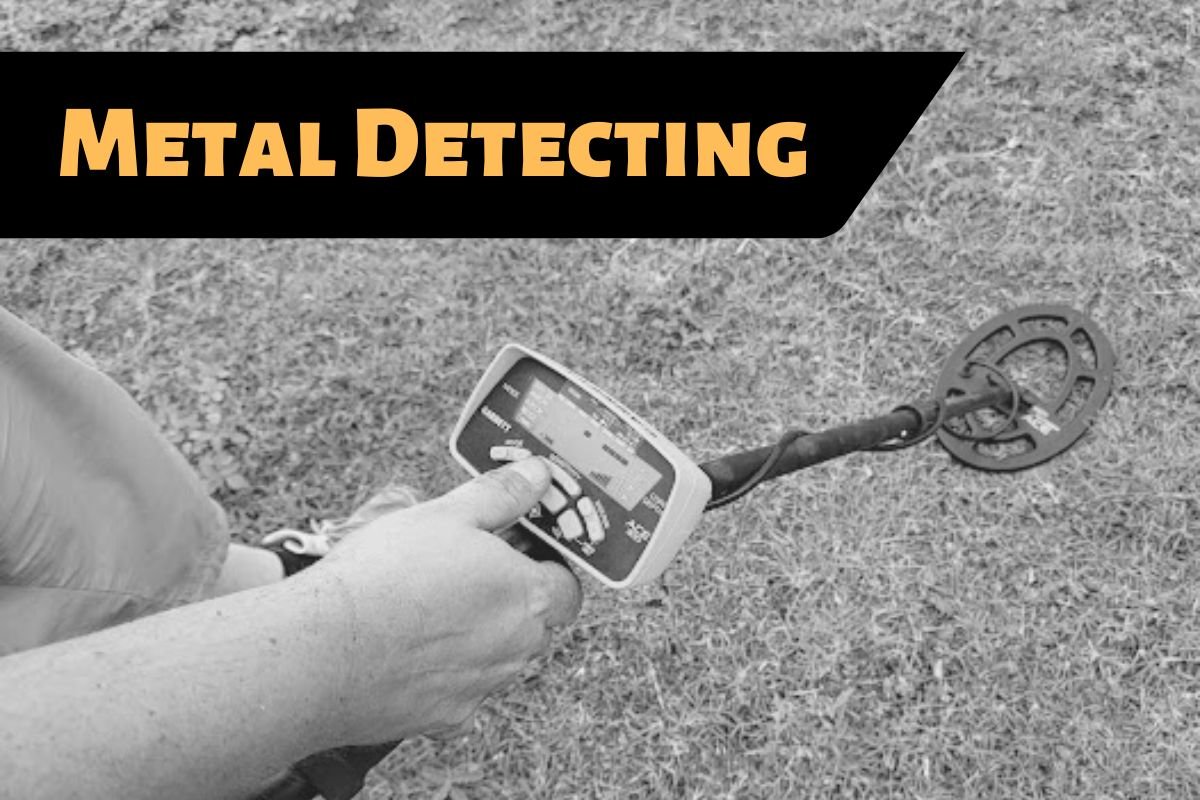Metal detecting has been around for many years. The hobby has many rewards that go beyond monetary value. With metal detecting you get to find relics of the past, you get exercise, and you get to spend time with friends and family.
What more could you ask for? This is why I go out metal detecting every chance that I get. The thrill of the next find and the history that you learn along the way.
What is Metal Detecting?
Metal detecting is a hobby that uses metal detectors to find coins, relics, and valuables. Metal detectors use magnetic fields to detect metals. Once someone learns to use a metal detector, they can start getting permission to detect in locations such as farms, houses, and other historical points of interest.
Metal detecting as a hobby has a huge community around it. You can link up with other detectorists on social media platforms, you can watch videos about metal detecting on YouTube, and you can watch live metal detecting on platforms like TikTok.
- What is Metal Detecting?
- How Do Metal Detectors Work?
- The Science Behind Metal Detectors
- The History of Metal Detectors
- Metal Detector Components
- Types of Metal Detectors
- Metal Detector Controls
- Do Metal Detectors Detect All Metals?
- How Well Do Metal Detectors Work?
- Do Metal Detectors Work Underwater?
- Metal Detecting Tips
- Is Metal Detecting Legal
- Metal Detecting in Places Other Than the U.S.
- Metal Detecting Code of Ethics
- Metal Detecting FAQ
Metal detectors are also used by law enforcement and armed forces to find weapons. They have helped agencies around the world sweep for dangerous items and keep dangerous items out of places like airports.
Now let’s look at how metal detectors work, how a beginner to metal detecting can get started, and some of the laws around where metal detecting is legal and where it isn’t.
How Do Metal Detectors Work?
Metal detectors transmit an electromagnetic field from the search coil, that penetrates the ground. When the electromagnet field reaches metal, it creates a magnetic field around the object. The receiving coil picks this up and alerts the detector through sound or blinking lights.
It is not that complicated at all, despite the science that is involved. Using a metal detector to find treasure is one of my favorite hobbies. You can find old coins, rings, jewelry, and other precious metals. This is just the quick answer to how metal detectors work, now let’s go into the science and history.
Want to learn how to metal detect? Check out our ultimate step-by-step guide on metal detecting for beginners!
The Science Behind Metal Detectors
The science that is used in metal detectors starts with electromagnetism. This discovery uncovered the relationship between electricity and magnetism. Source.
It is used in a metal detector, by transmitting the electromagnetic field through the search coil. This penetrates the metal in the ground, causing a magnetic field to form around the metal object, by energizing it. It is then sent back through the search coil, to the control box, which processes the signal and converts it into a frequency, sound, or blinking light.
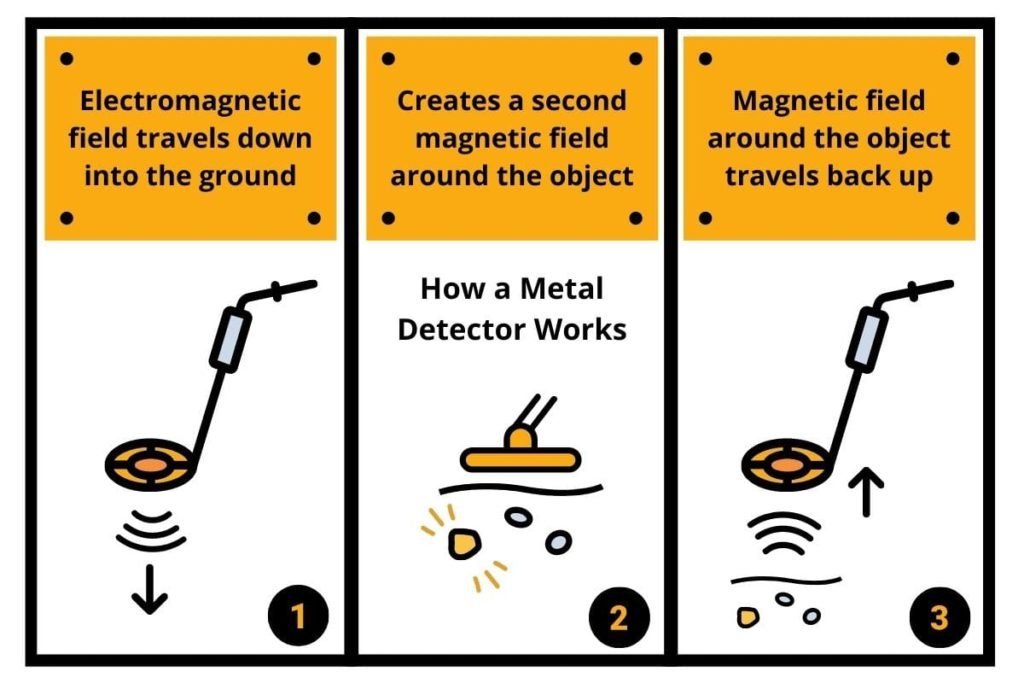
With the first swipe of the metal detector, the magnetic field is transmitted into the metal object in the ground, where the atoms of that object become energized and magnetic. The second swipe picks up that new magnetic field and sends it back up the search coil to the control box. This is why you must swipe the metal detector back and forth to receive the signal.

The History of Metal Detectors
The greatest contribution to this technology came from Clerk Maxwell. He developed mathematic equations called “Maxwell’s Equations.” His work helped to figure out that when there is a changing electronic field there is also a changing magnetic field. Source.
This is how the concept of electromagnetism was developed. This is one of the main controlling principles of the metal detector. This concept was then used by Alexander Graham Bell, who built an electromagnetic metal finding device for locating the bullet that shot American president James A. Garfield, which was lodged into his arm (the bullet was not found but the technology proved to work.)
The portable metal detector was later invented by a German engineer named Gerhard Fischer, who patented his device, called a Metalloscope in 1933. The portable metal detector went through multiple transformations and became the electronic and digital metal detectors that we know today.
Metal detectors have been used throughout history, with various uses, during wars, to find buried mines, and to detect guns and other dangerous weapons. They are now a popular way to find lost or buried treasure.
Metal Detector Components
There are four main components of a metal detector. Each piece serves its purpose in making the device work. Most metal detectors are lightweight and easy to use.
The four components of a metal detector:
- Stabilizer
- Control Box
- Shaft
- Search Coil
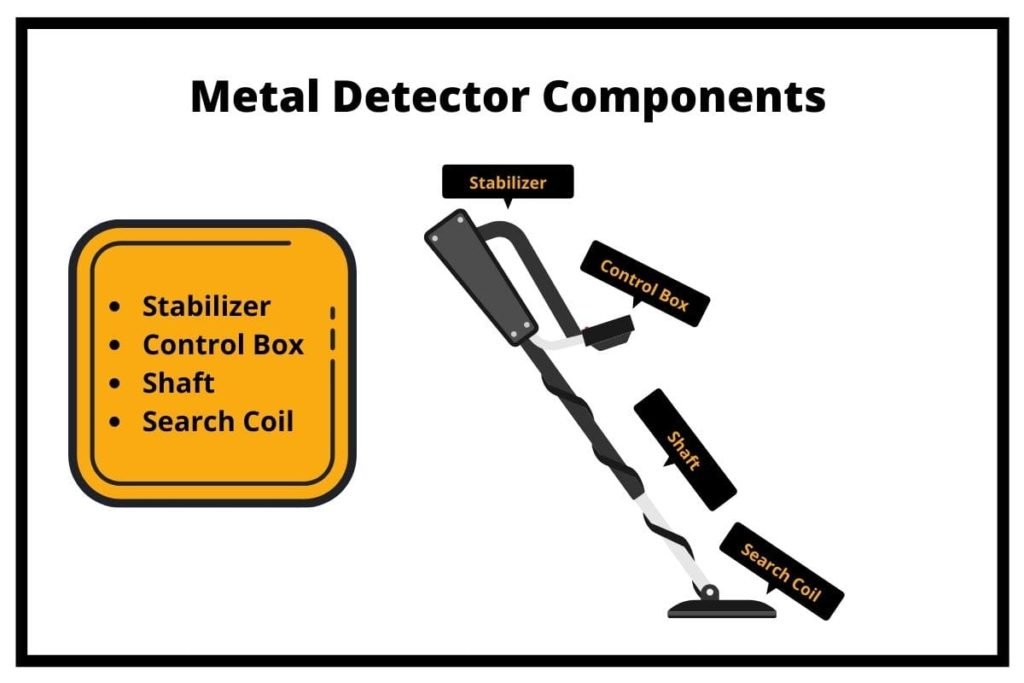
The stabilizer is the piece that connects with your arm, keeping the device steady as you use it. The control box holds the batteries, contains the settings and knobs, and converts the signal into a sound or blinking light. The shaft is the part that the other pieces connect to. The search coil is made up of multiple coils and is the base that you use to sweep across the ground.
Types of Metal Detectors
There are three main types of portable metal detectors. Each one uses a slightly different technology. You will want to choose the correct type based on your needs. The simpler type (BF0) is not as practical as the more thorough designs.
The three types are:
- VLF (Very Low Frequency)
- PI (Pulse Induction)
- BFO (Beat-frequency oscillator)
Very low-frequency metal detectors are Induction Balance (IB) detectors that use low frequencies. These metal detectors are built with two coils. The outer coil transmits an alternating current to the metal object in the ground. The inner coil picks up the magnetic field of the conductive metal.
Pulse induction metal detectors send a sequence of electronic pulses down to the search coil, producing a magnetic field. The pulse penetrates the ground and locates a target object, which then sends an answering pulse back up to the control box where a circuit measures the pulse.
Beat-frequency oscillator metal detectors use two radiofrequency oscillators, that are tuned to a similar frequency. The first oscillator is called the search oscillator, and the second is the reference oscillator. The search coil is disturbed by a conductive metal and the search oscillator shifts to produce a signal.
The VLC metal detector has the most range for different types of metal. It is the metal detector used by the more serious treasure seeker. The pulse induction metal detectors can penetrate the ground deeper, allowing you to detect objects deeper down.
The beat-frequency metal detectors are one of the first designs ever made. They do not have the accuracy of the other two and are considered outdated. This technology is used in cheap detectors, and toy detectors.
Metal Detector Controls
There are two main controls of a basic metal detector. These are sensitivity and discrimination. Both of these controls can be adjusted to fine-tune the device to find the metals you are after. You can find the right frequencies by testing the detector on a nail, or penny, and adjusting the frequencies to find the desired object.
What is sensitivity on a metal detector? Sensitivity is used to measure the type and size of the metal that you are detecting. The more sensitivity your metal detector has, the more ability it will have to detect small irregular-shaped pieces.
What is discrimination on a metal detector? Discrimination is what gives the metal detector the ability to identify targets, based on the type of metal. With this, you can determine if it is worth it, to dig up the metal, based on if it is silver, gold, or a lesser-valued metal.
A more complex metal detector may also have a volume nob for the sound and several other elements that are used to fine-tune detection. Each type of metal causes a different frequency and digital metal detectors give you more control over identifying objects.
Common digital metal detector elements:
| Sample | Iron Nail | 5 ¢ Coin | Pull tab | Alloy Screw | 1 ¢ Coin | 10 ¢ Coin | 25 ¢ Silver | 50 ¢ Silver | 1$ Silver |
| Tone | Low Tone | Low Tone | Middle Tone | Middle Tone | Middle Tone | High Tone | High Tone | High Tone | High Tone |
| Target Indication | Iron | 5 ¢ | P-TAB | S-CAP | 1 ¢ | 10 ¢ | 25 ¢ | 50 ¢ | 1$ |
| Digital Target Indication | 0-9 | 10-19 | 20-29 | 30-39 | 40-54 | 55-64 | 65-79 | 80-89 | 90-99 |
Do Metal Detectors Detect All Metals?
Some metal detectors can detect all metals, both ferrous and nonferrous. VLF metal detectors are the best for this since they have more versatility. Older models such as beat-frequency oscillators cannot detect all metals.
What metals cannot be detected by a metal detector? Metal detectors have a hard time detecting any metal that is not extremely conductive. Stainless steel can be hard to detect because it has poor electrical conductivity. The same goes for other metals with poor conductivity. Metal detectors only detect metal items, they will not detect bones, pearls, gemstones, or other non-metal items.
I started with a budget-friendly machine, the Garret Ace 300. You can find that metal detector here.
How Well Do Metal Detectors Work?
How well a metal detector works is based partially on what type and brand of metal detector you have. Some models have better sensitivity and more options for dialing in the settings. Just like with anything, you get what you pay for.
A VLC and BI metal detector works better than the simpler BFO types. No metal detector is 100% accurate, you may have to play with the dials and swipe over areas multiple times.
The best thing you can do is practice with different types of metals. That way you can determine the exact settings for your particular metal detector. Put things like a nail on the ground outside, and then a silver quarter, so you can find out what frequencies are correct for those metal types. This works particularly well for metal detectors that do not have all of the digital settings.
Many treasures have been found and reported every year, around the world. In England, there were over 1,000 treasures discovered in 2018, with many more found in other countries and regions.
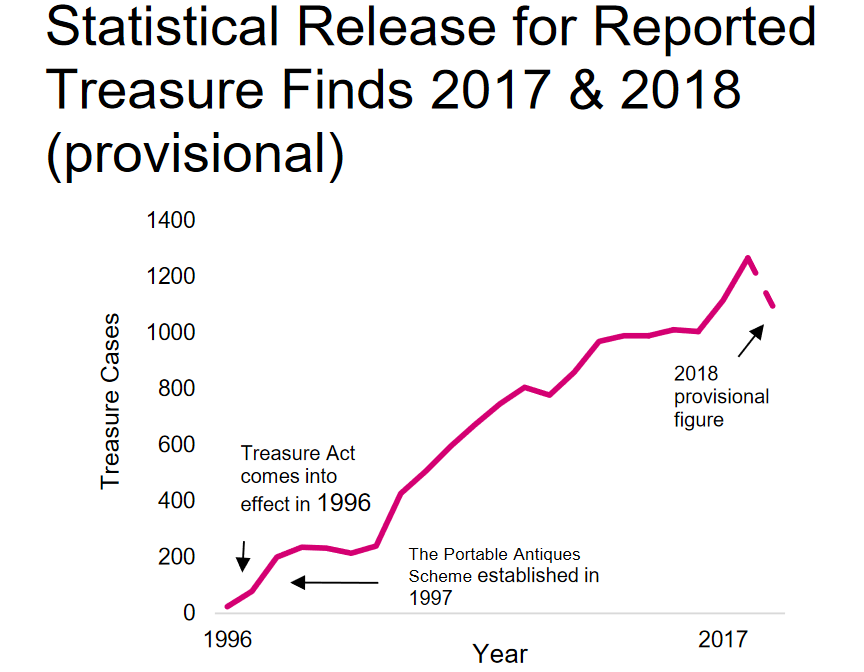
I have owned many metal detectors throughout the years, and all of them perform well to this day. My favorite machine to use you can find here.
Do Metal Detectors Work Underwater?
Most modern metal detectors are waterproof and can be used partially underwater. This is extremely useful for searching river beds, or beaches. There is a river in Texas called the Guadalupe River, where people go tubing. Friends of mine have found all kinds of rings and jewelry that people have lost in the river, by metal detecting at the points where the water falls down a notch.
You may also want to use a snorkel and other water accessories for going underwater to dig in places where the water is deep. You may have to get a particular model if you plan on completely submerging it. Most of them are only waterproof in the bottom half of the metal detector.
Getting started when metal detecting can be a struggle when you don’t understand how to use your detector, where to detect, or how to properly dig for your target. I’ve been metal detecting for many years, and over the years I’ve come to learn many metal detecting tips and tricks.
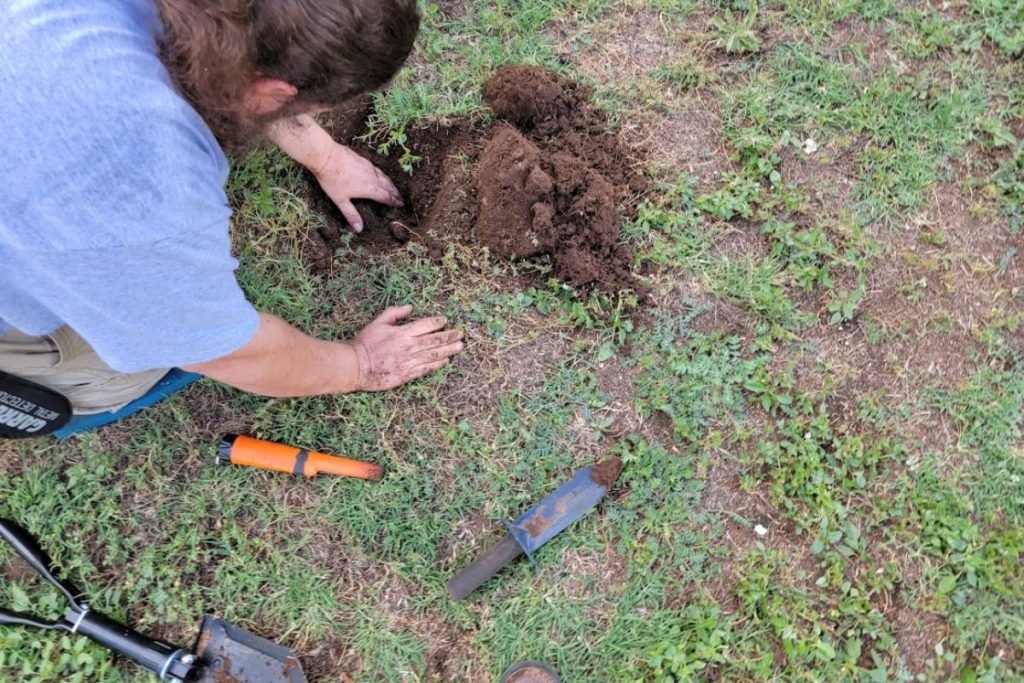
Like what you’ve read so far? When your done with this one, check out these!
How Deep Do Metal Detectors Go
Can Metal Detectors Detect Diamonds
Can Metal Detectors Detect Gold
Can You Make Money with a Metal Detector
Best Places to Metal Detect
How to Find Rings Metal Detecting
Metal Detecting Tips
Here are 10 metal detecting tips that I wish I would have learned sooner!
Tip 1 – Learn your machine first.
The first thing you want to do is learn how your metal detector works. Start in your own yard with different test targets, such as a penny or a quarter.
You can also test other objects such as silver coins, gold jewelry, and more. The point of testing these objects is to see what types of signals they give.
You can even bury the objects at different depths to set up your machine. You can set your sensitivity and discrimination so that you are targeting these kinds of objects.
Tip 2 – Cut a perfect plug.
One important part of retrieving targets is digging a hole and filling it back in. The best practice for this is to dig a circular “plug” in the grass and ground. You can use just your shovel or you can use a hand tool such as a garden spade.
Try to dig or cut in a circle, that way you can pull the plug out, retrieve the target and drop it back in. This method makes it easy to stomp the plug back down into the ground, making it look as though there was never a hole in the first place.
Tip 3 – Team up with others.
The more people you have working on getting permission from different locations, the more opportunities to metal detect will present themselves. You can cover more ground at a location, with more people, which can make it easier to find out if a spot is worth sticking around at.
The metal detecting community is full of great people who want to help others who are new to the hobby. Reach out to someone in your area and they can show you the ropes or help you make connections.
Tip 4 – Dig every signal at first.
When starting out you will want to dig every signal you find. You can learn how to set the sensitivity and discrimination later, at this point you want to learn what signals your machine gives so that you do not miss out on anything.
If you do not know exactly how your metal detector works with different signals then this is an opportunity for you to learn. You may discriminate against the signal that beer can pull tabs comes in at, however, that signal may also yield gold items or nickels as well.
Tip 5 – Try out more than one metal detector.
There are many great starter metal detectors, but there are also different types of metal detectors that can be easier to use, and harder to use. When the machine has more technology, you have more to learn about how to use it.
Even though you can learn on a simple machine if you decide you want to continue the hobby further you will want to try a machine with more technology so that you can find what works best for you.
Tip 6 – Get permission from friends and family.
One of the hardest parts about metal detecting is finding a location where you have permission to metal detect. You are not allowed to metal detect on other people’s private property, or in cities where it is not allowed.
The easy answer to this is to ask friends and family for permission to metal detect on their properties. This way you have permission if anyone comes around asking what you’re doing. This will also get you more permissions from word of mouth, and people who see you out there doing your thing!
Tip 7 – Reach out for permission from other people.
Once you are comfortable with metal detecting on friends’ locations, you can move on to asking other people for permission. Start with your neighborhood, knock on doors, and ask if they mind if you metal detect their front yard.
Many times people will say yes. Farmers will usually let you metal detect in their fields if you reach out to them and set up a time. Once you have gotten a few permissions you can start researching location sites.
Tip 8 – Research the history of metal detecting locations.
This is where things really get exciting. You should start to research the history of locations where you want to metal detect. Farmer’s fields, and old parts of town, could have been home to homesteads, settlements, old general stores, and more.
With old maps, you can find the locations of old town dumps, trails that pioneers used, and other historical places that will no doubt yield old relics and coins. Once you have located some areas of interest reach out and get permission to metal detect.
Tip 9 – Master the art of getting permission.
Once you have experienced finding a silver coin for the first time, or something better, you are going to be hooked on metal detecting! You are going to need to get good at asking permission. You will need to learn how to reach out to property owners.
The best way to do this is to look up the owner through property records, then send a letter, email, or call them on the phone, asking for permission to metal detect on their property. Worst case scenario, they say no. Best case, they say yes, and it leads to multiple other permissions.
Tip 10 – Older homes and properties have better results.
Our final tip is to seek out older neighborhoods, with older homes. Research locations to find old settlements, homesteads, and more. These types of places have older relics and older coins. These types of finds are more valuable than the modern change you will find at a new home.
You can use websites like Zillow, to find out what year a home was built. You can find old neighborhoods with old homes, and then knock on doors to ask for permission, this is probably the best way to get permission at older homes that have awesome treasures to find.
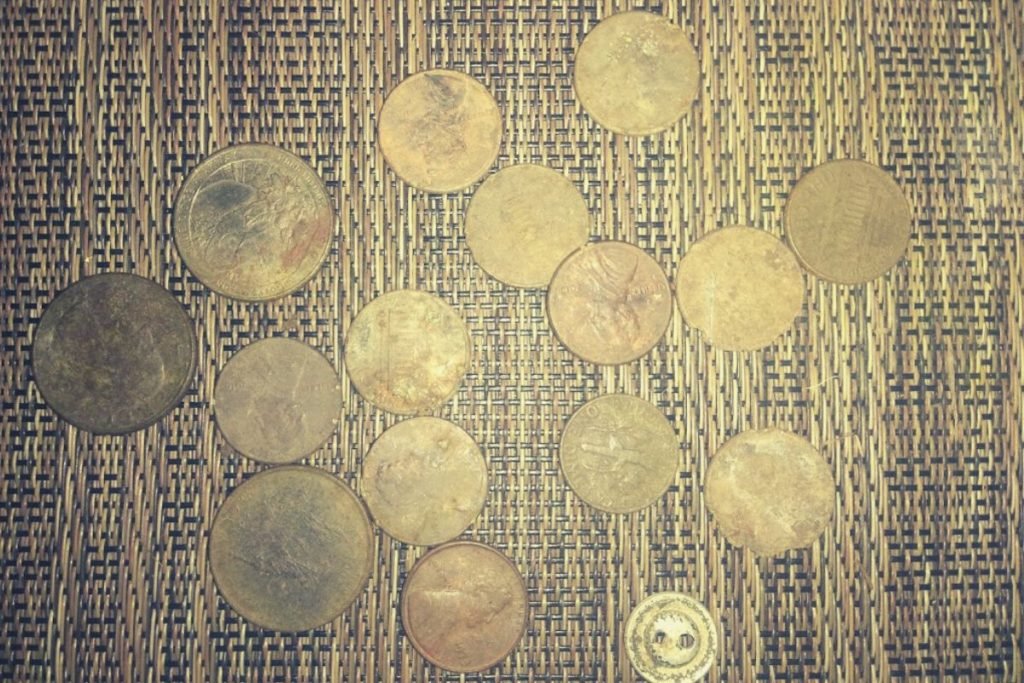
Now that you have a few tips from me, let’s look at the legal side of metal detecting. This is where it get a little blurred. Some cities and counties allow metal detecting, some do not. You have to do some research and ask permission to metal detect if you do not own the land.
There’s a lot to learn with metal detecting, here are a few more topics you should get familiar with!
Best Places to Metal Detect for Old Coins
Can You Metal Detect on Beaches
Can You Metal Detect in State Parks
Best Places to Metal Detect for Gold
Is Metal Detecting Legal
Knowing if metal detecting is legal or not is a tricky subject. Depending on what country, state, county, or city you’re in, the laws can vary widely.
When metal detecting on federal or state-owned public land there are a lot of laws that come into play. You should be most careful to know the law when metal detecting in these places.
It is up to the individual metal detectorist to know the law and use good judgment when finding new places to search. Counties and cities do not usually have the rigorous standards that federal and state lands do.
However, each individual county and city may have its own laws regarding metal detecting, so make sure you check with your local officials beforehand.
Is Metal Detecting Illegal?
Part of the fun of metal detecting is not only finding precious metals but also finding relics and uncovering history. Some of my favorite finds were not that valuable.
Recently, I found a presidential token that was the prize from a Cracker Jack box. The token was from 1932 and displayed our 20th president James A. Garfield. During that same session, I found an all-metal cap gun from around the same era.

In the U.S., our history only goes back a couple of hundred years as far as metal detecting finds go. But even still, discovering pieces of our history is one of my favorite things about metal detecting.
That being said, one might think that historical sites would be the first place to start. Unfortunately, that is not the case. Metal detecting at historic sites like Fort Smith National Historic Site is not only illegal, it’s a felony.
Thanks to laws such as the National Historic Preservation Act of 1966, metal detecting any national historic site is illegal. This act states that “the spirit and direction of the Nation are founded upon and reflected in its historic heritage” and that they shall “administer federally owned, administered, or controlled prehistoric and historic resources in a spirit of stewardship for the inspiration and benefit of present and future generations.
The act does not explicitly say “no metal detecting allowed”. However, it has provisions that forbid any item to be excavated and removed from the property. This federal law carries over to state and local historic sites as well, giving them the same protection under the law.
Where is metal detecting legal?
While many federal lands are off limits to metal detectorists, one exception is our National Forests. Unlike national parks, national forests are managed under a multiple-use concept, meaning they provide Americans with a number of services, including lumber, grazing, mineral, and recreation. Source.
Metal detecting is usually allowed in parking lots, campsites, and picnic areas and you can often keep jewelry and coins that you find. Regulations can vary so, as always, check with local officials before you start.
Forest Service policy states that the recreational use of metal detectors and the collection of rock and mineral samples are allowed on the National Forests. Most National Forests are open to recreational mineral and rock collecting, as well as gold panning and prospecting using a metal detector.
Metal Detecting on Private Land
The best place to metal detect is on private property with the owner’s permission. Old farms and homesteads can yield some great finds. Knowing the area you want to search is key to gaining permission and locating ideal places.
Getting to know the people who live and work in an area holds a wealth of great hunting opportunities. Many people have dogs and this is often a reason people use to not allow you to metal detect on their property. Carrying dog treats and letting people know that you like dogs is a good icebreaker and blocks this objection from the start.
Once you get to know people, you will gain permission without even trying. Often while detecting somewhere I have permission to do so, I will have others in the community, curious about what I am doing there, come up and talk to me. This is a great opportunity to make a new connection and, very often, I receive an invitation to detect at one of their properties without even asking.
You should always try to get permission in writing, especially if the property owner is not going to be present. Regulations set by the state or federal government do not apply to private property unless that property includes a historical or archaeological site.
Metal Detecting National Parks
The Code of Federal Regulations pertaining to the National Parks Service clearly states that possessing or using a mineral or metal detector, magnetometer, side scan sonar, other metal detecting device, or subbottom profiler is prohibited.
The exceptions within the code include:
- A device broken down and stored or packed to prevent its use while in the park area.
- Electronic equipment used primarily for the navigation and safe operation of boats and aircraft.
- Mineral or metal detectors, magnetometers, or subbottom profilers used for authorized scientific, mining, or administrative activities.
Is Metal detecting Legal on Beaches?
There are a lot of different kinds of beaches. As a general rule beaches are ok to metal detect. The Army Corps of Engineers constructed and maintains many lakes and reservoirs.
The use of metal detectors is permitted on designated beaches or other previously disturbed areas unless prohibited by the District Commander for reasons of protection of archaeological, historical, or paleontological resources.
Sometimes, in state laws concerning metal detecting, beaches are lumped in with parks and schools. Some of these areas allow metal detecting altogether and other similar places within the state permit metal detecting, however, you are not allowed to dig.
Still, other beaches allow metal detecting with a permit only. Part of a beach may be the property of the state, county, or city that permits metal detecting while another part of the beach is owned by the National Parks Service. These areas are usually clearly marked.
Designated public swim beaches and campsites often permit metal detecting but you must gain permission from the area supervisor first. Some states, such as North Carolina, allow metal detecting on public recreational beaches except during June, July, and August.
Metal Detecting on Federal Land
All U.S. states are subject to federal laws including the Archaeological Resources Protection Act and the National Historic Preservation Act. These laws are in place to protect historical and culturally significant artifacts.
No man-made item over 50 years old may be removed from state, public, or federal lands and, if you find an item fitting that description, you are required to report it to the proper authorities.
Can I Get Fined for Metal Detecting?
Metal detecting in areas where it is against the law can result in a fine, imprisonment, or both. It is not illegal to metal detect in counties and cities lands where there is no law against it. However, there are many municipalities that require a permit so make sure you check beforehand.
Metal Detecting in Places Other Than the U.S.
In England and Wales, similar to the U.S., you need permission from the landowner to go metal detecting, unless the site is historically protected, in which case all metal detecting is illegal.
In the UK, people who engage in illegal metal detecting for historical artifacts to be kept for personal collections or sold on the black market for personal gain are called nighthawkers. The name comes from the fact that they do this illegal form of metal detecting at night.
There is no designation for the crime on police databases in the UK. It is usually just marked as trespass because at the end of the day no one knows what was taken. It is simply just a hole in the ground.
In the eastern hemisphere, the art of metallurgy has been around for quite some time. In places like Ireland, there are many more archaeological artifacts that one might come across with a metal detector than in the United States.
Metal detecting causing damage to archaeological sites and objects there is serious business. Such usage there is subject to severe penalties, including fines, imprisonment, or both.
Metal Detecting Code of Ethics
Metal detecting is a fun and interesting hobby. Legal requirements include federal, state, county, and local laws that can be tough to navigate. Joining a metal detecting club or association is a good way to participate in the activity responsibly.
No matter where you metal detect you should always be respectful of others. Following these best practices will make sure that you do not compromise the rights and property of others.
- Respect private property and always secure permission before metal detecting.
- Follow all federal, state, and local laws related to metal detecting.
- Respect archaeological and historical places, natural resources, and wildlife.
- Be thoughtful, considerate, and courteous at all times.
- Close gates and properly dispose of trash. Leave things as you found them.
- Always fill all excavations.
- Report items found that have a significant historical value to the proper officials.
Metal detecting is a hobby that I have shared with my my grandfather, with my brother and other family members as well as friends. As long as you keep up with the code of ethics, and do not trespass onto someones land, you will do just fine.
Here are some frequently asked questions we’ve put together about metal detecting.
Metal Detecting FAQ
- How to Clean Gold (w. Steps) - February 10, 2024
- How Can You Tell if Gold is Real? An In-Depth Guide - February 10, 2024
- Top Metal Detecting Accessories and Tools - February 7, 2023

